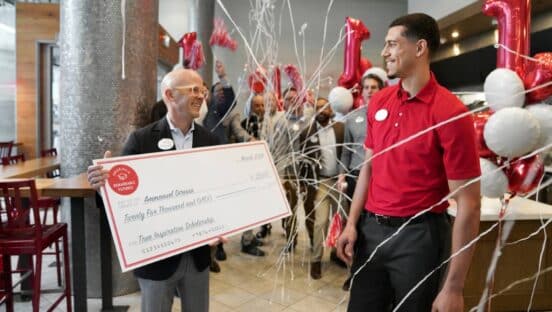Just this past week, more than a dozen states announced they plan to end enhanced weekly unemployment benefits. At least 16 governors expect to cut it off as early as June 12 and as late as July 10. If so, some 2 million people across Alabama, Arkansas, Arizona, Georgia, Idaho, Iowa, Mississippi, Missouri, Montana, North Dakota, Ohio, South Carolina, South Dakota, Tennessee, Utah, and Wyoming could be affected, per CNBC. And we’re talking workers, not employers.
Of course, this would signal a huge shift for restaurants and other sectors battling for hourly workers. A recent Black Box Intelligence survey of 360-plus operators found 57 percent of restaurant owners credit “higher pay through unemployment” for today’s labor shortage.
President Joe Biden’s $1.9 trillion American Rescue Plan extended a $300 weekly federal boost through September 6, which has left the recruiting pool a cloudy place, some operators believe.
Food and drink places added 187,000 jobs in April, according to the U.S. Bureau of Labor Statistics. Roughly 10.64 million were on payroll. However, this is still down 1.65 million from February 2020.
READ MORE: Why the Hiring Crisis is a Moment of Reckoning for Restaurants
Biden said last Monday workers who collect unemployment and are offered a suitable job must take the opportunity or lose their unemployment benefits. This hasn’t been so clear at times during the pandemic.
“There are a few COVID-19-related exceptions so that people aren’t forced to choose between their basic safety and a paycheck, but, otherwise, that’s the law,” Biden said in a statement.
“I think the people who claim Americans won’t work even if they find a good and fair opportunity underestimate the American people,” he added. “So we’ll insist that the law is followed with respect to benefits, but we’re not going to turn our backs on our fellow Americans.”
The White House said it would direct the Department of Labor to reaffirm unemployment standards and to help states reinstate “work search” requirements for those utilizing unemployment insurance.
Yet how this gets enforced isn’t entirely clear, and either is the timing. Montana Gov. Greg Gianforte led the charge on announcing his state would cut the expanded benefits, stating, “Incentives matter, and the vast expansion of federal unemployment benefits is now doing more harm than good. We need to incentivize Montanans to reenter the workforce. Our return-to-work bonus and the return to pre-pandemic unemployment programs will help get more Montanans back to work.”
Restaurants have gone to creative ends to attract workers. Donatos created a “Dinnerviews” program consisting of walk-in interviews with no appointment necessary. After meeting with a member of the Donatos team that could land the prospective associate a job on the spot, applicants receive a certificate for a free large one-topping pizza. Applebee’s, which is looking to hire 10,000 people, is giving every candidate 18 years or older that attends an interview a free appetizer as part of the chain’s “Apps for Apps” program.
Rewards Network suggests restaurants leverage their current network and staff for referrals, among other options. For example, operators could offer every referral and resulting new hire a $100 bonus after the first month and another $250 after six months. While these seem like large amounts to pay upfront, the company said, if you consider that bonuses are being paid over the course of a 30-hour work week, then you are increasing the cost of an employee by less than $1 an hour if they stay the full six months and that extra cost will decrease every shift after the initial six months.
Bonuses can be especially effective for enticing qualified back-of-house employees who do not typically receive tips, Rewards Network added. “The goal in hiring for any particular position is longevity—high-staff turnover can be disruptive and may cost you money in the long run. To avoid this, make sure that your bonuses are drawn out over time, which keeps your risk low and the employees’ opportunity to continually earn more, high.”
QSR caught up with Decisely CEO Kevin Dunn to chat about the labor environment. Decisely is a certified B corporation in the insurtech space that does modern HR administration with an automated technology platform and has worked with KFC franchisees as well as Chick-fil-A and Arby’s operators.
Let’s start with the “so-labeled hiring crisis” facing restaurants today. What are you seeing and hearing from the trenches?
Restaurant owners are turning to current employees first with insurance benefits and other perks to retain them and build a reputation as a great place to work and grow! Restaurant owners who work hard to reward and retain their current team members will beat out those who don’t. Owners are also rewarding existing staff with bonuses for finding new hires. It’s a war for talent, especially in the hourly-wage worker market.
Owners are also getting creative and aggressive with their hiring—building compelling job descriptions and placing them on attractive recruiting webpages, posting them where they are highly visible within the community they serve, and reaching out to prospects via media the prospects use, are having success. This may include holding local, virtual job fairs.
Do you buy into the notion expanded unemployment benefits are keying the challenge? The idea people can make more at home than at work in restaurants. What are some other culprits you believe are factoring into the challenge to hire workers?
It’s probably one factor, particularly for hourly wage businesses such as restaurants, hotels and construction. An article in the May 6 Wall Street Journal cited enriched unemployment as an issue. But fears of COVID-19 remain, as well as unresolved childcare issues. Many of these workers have family responsibilities that have not yet been addressed.
Let’s shift to some solutions. Your company specializes in creating benefits for franchisees to offer employees. Walk us through what that looks like.
We do. Our goal is to build a spectrum of healthcare solutions that “leaves no team member behind.” We work with franchisors to help identify the healthcare solutions owner operators and employees need and can afford—from telemedicine to gold-level insurance plans—so employees from seasonal to management have access to affordable products that keep them healthy. We source healthcare solutions, market and sell the program to franchisees, enroll employees and administer the plans on a cloud-based HR platform. It’s important for franchisors to avoid joint employer liability, and companies like Decisely, who administer these programs, help them maintain that distance from franchisees.
An additional goal is to keep it as easy as possible for these owners—they need to save money, they need an easy way to administer the plans, and they need to get back to running their businesses. We help them do that.
What are some success stories brands have had doing so?
We work with franchise owners who previously had benefits they sourced on their own, now saving 25-30 percent or more—as much as $100,000 a year. Employees are saving as much as $6,000 a year. Think about what that means to an employee making $45,000 a year. It’s a great deal of money back in their pocket that they can put back into the economy in other ways. One of our favorite stories came from a franchise owner who was expecting to save over 30 percent. He ultimately saved somewhat less than that—because more of his employees were able to enroll in the more affordable plan. A happy outcome for him because he’s building some great employee loyalty.
How important is it to think beyond just wages as a restaurateur looking to attract talent?
Wages are important and will continue to be important as long as restaurants and other hourly businesses fight for the same talent. However, one statistic I’ve seen is that as many as 78 percent of employees will stay in their job for the benefits. Health insurance is important to workers—and affordable health insurance helps keep employees happy.
What does this look like six months from now? In other words, how do you think the current crisis shapes the future? Will it change how restaurants recruit and retain employees?
Small businesses have accounted for 65.1 percent of net new job creation since 2000 and I believe small businesses will restart American employment post-pandemic.
The pressure to reward and retain good workers will remain; additionally, health care costs will continue to rise. The combination of good wages and good benefits will continue to attract and retain good workers. Innovation in recruiting as well as healthcare solutions will be important.
What role will tech play in this?
Tech will be the driver in recruiting. Prospects want to communicate with employers in a mode they are most comfortable with, so communicating via text, chat and/or email will be important to building a good base of recruits. Owners, HR Managers and employees are going to continue to need cloud access; whether it’s because of pandemic restrictions or lack of gas from a disrupted pipeline, the future is in outreach to team members outside the restaurant itself. The need for integrated, paper-free HR tools will continue to help franchise restaurant owners work more efficiently. There’s not a part of the employee recruiting/hiring/onboarding/management process that tech won’t touch.













